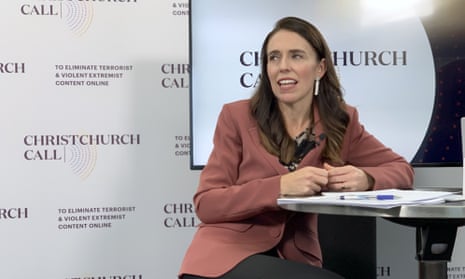Tech companies need to make more progress on algorithms that can drive social media users to become radicalised, New Zealand’s prime minister, Jacinda Ardern, has said.
Along with France, New Zealand is leading a push to rid the world of extremist and terrorist content online – known as the Christchurch Call.
The initiative was launched after the deadly mosque attacks in Christchurch in March 2019 that killed 51 people and wounded dozens more, which was livestreamed by the attacker and stored online.
Ardern and her co-chair, France’s President Emmanuel Macron, hosted world leaders, tech company executives and affected communities – including Kiwi Muslim leaders – in a virtual Christchurch Call summit early on Saturday.
The US secretary of state, Antony Blinken, and Canadian prime minister, Justin Trudeau, were among those attending.
Ardern said the agreement, which brings together countries and tech companies to try to de-radicalise online spaces, had “such momentum”.
“We will not … prevent future atrocities such as what we experienced here on 15 March unless we work together,” she said.
The group has devised a new work programme for the next year and among its goals is changing how online content is delivered by tech companies.
A key finding of the royal commission into the Christchurch mosque attacks was that the man who carried them out, Australian Brenton Tarrant, who has since been jailed for life without parole, was radicalised on YouTube and other online spaces while viewing white-supremacist material.
YouTube’s algorithms link users to videos similar to those they are already watching, meaning viewers are recommended further extreme content. After her country’s experience, Ardern wants to see this change – and believes that it is happening.
“That is probably the biggest focus for the Call community over the next year,” she said.
“Let’s have that conversation around the ethical use of algorithms, and how they can use be used in a positive way and for positive interventions.
“When we look at the environment in which the terrorist for 15 March was radicalised, even in that period in those two years there has been significant change by many of the platforms.
“Algorithms are where many of us are looking to.”
YouTube chief executive, Susan Wojcicki, said on Twitter her company was continuing “to strengthen our policies, improve transparency, and restrict borderline content”.
After holding out on membership for two years, the US joined up as a supporter of the Call this week. China and Russia are not members.
The Christchurch Call has also developed a protocol which can intervene to stop the livestreaming of similar attacks.
This has occurred on two other occasions, during a 2019 shooting in Halle, Germany and a 2020 attack in Glendale, Arizona.
